
Kevin Wayne Jeter is an American science fiction and horror author known for his literary writing style, dark themes, and paranoid, unsympathetic characters. He has written novels set in the Star Trek and Star Wars universes, and has written three sequels to Blade Runner. Jeter coined the term "steampunks".

Paul J. McAuley is a British botanist and science fiction author. A biologist by training, McAuley writes mostly hard science fiction. His novels dealing with themes such as biotechnology, alternative history/alternative reality, and space travel.
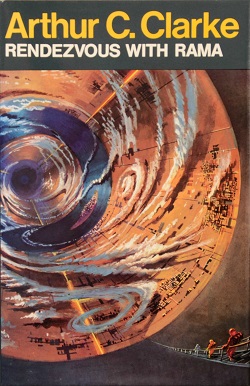
Rendezvous with Rama is a 1973 science fiction novel by British writer Arthur C. Clarke. Set in the 2130s, the story involves a 50-by-20-kilometre cylindrical alien starship that enters the Solar System. The story is told from the point of view of a group of human explorers who intercept the ship in an attempt to unlock its mysteries. The novel won both the Hugo and Nebula awards upon its release, and is regarded as one of the cornerstones in Clarke's bibliography. The concept was later extended with several sequels, written by Clarke and Gentry Lee.

Gregory Dale Bear was an American writer and illustrator best known for science fiction. His work covered themes of galactic conflict, parallel universes, consciousness and cultural practices, and accelerated evolution. His last work was the 2021 novel The Unfinished Land. Greg Bear wrote over 50 books in total.

Mary Doria Russell is an American novelist.
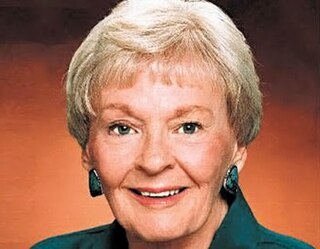
Sheri Stewart Tepper was an American writer of science fiction, horror and mystery novels. She is primarily known for her feminist science fiction, which explored themes of sociology, gender and equality, as well as theology and ecology. Often referred to as an eco-feminist of science fiction literature, Tepper personally preferred the label eco-humanist. Though the majority of her works operate in a world of fantastical imagery and metaphor, at the heart of her writing is real-world injustice and pain. She employed several pen names during her lifetime, including A. J. Orde, E. E. Horlak, and B. J. Oliphant.

Richard Kingsley Morgan, is a British science fiction and fantasy author of books, short stories, and graphic novels. He is the winner of the Philip K. Dick Award for his 2003 book Altered Carbon, which was adapted into a Netflix series released in 2018. His third book, Market Forces, won the John W. Campbell Award in 2005, while his 2008 work Thirteen garnered him the Arthur C. Clarke Award.
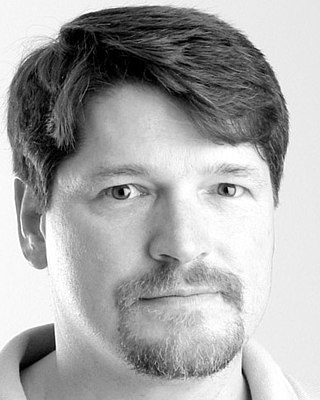
Bruce Bethke is an American author best known for his 1983 short story "Cyberpunk" which led to the widespread use of the term for the cyberpunk subgenre of science fiction. His novel, Headcrash, won the Philip K. Dick Award in 1995 for SF original paperback published in the US.

Ian McDonald is a British science fiction novelist, living in Belfast. His themes include nanotechnology, postcyberpunk settings, and the impact of rapid social and technological change on non-Western societies.
Tim Pratt is an American science fiction and fantasy writer and poet. He won a Hugo Award in 2007 for his short story "Impossible Dreams". He has written over 20 books, including the Marla Mason series and several Pathfinder Tales novels. His writing has earned him nominations for Nebula, Mythopoeic, World Fantasy, and Bram Stoker awards and has been published in numerous markets, including Asimov's Science Fiction, Realms of Fantasy, Orson Scott Card's InterGalactic Medicine Show, and Strange Horizons.
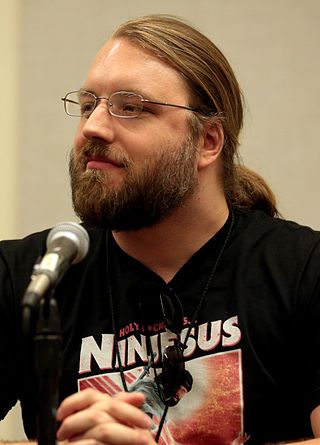
Scott Lynch is an American fantasy author, best known for the Gentleman Bastard Sequence series of novels. His first novel, The Lies of Locke Lamora, was purchased by Orion Books in August 2004 and published in June 2006 under the Gollancz imprint in the United Kingdom and under the Bantam imprint in the United States. The next two novels in the series, Red Seas Under Red Skies and The Republic of Thieves, were published in 2007 and 2013, respectively. The planned fourth of seven books in the series will be The Thorn of Emberlain.

Pyr was the science fiction and fantasy imprint of Prometheus Books, launched in March 2005 with the publication of John Meaney's Paradox. In November 2018 it was sold to Start Publishing.
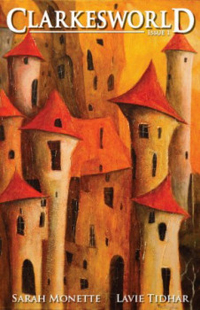
Clarkesworld Magazine is an American online fantasy and science fiction magazine. It released its first issue October 1, 2006, and has maintained a regular monthly schedule since, publishing fiction by authors such as Elizabeth Bear, Kij Johnson, Caitlín R. Kiernan, Sarah Monette, Catherynne M. Valente, Jeff VanderMeer and Peter Watts.
The Locus Award for Best First Novel is one of the annual Locus Awards presented by the science fiction and fantasy magazine Locus. Awards presented in a given year are for works published in the previous calendar year. The award for Best First Novel was first presented in 1981. The Locus Awards have been described as a prestigious prize in science fiction, fantasy and horror literature.
Geoff Ryman is a writer of science fiction, fantasy and slipstream fiction. Ryman has written and published seven novels, including an early example of a hypertext novel, 253. He has won multiple awards, including the World Fantasy Award.

Samuel R. "Chip" Delany is an American writer and literary critic. His work includes fiction, memoir, criticism, and essays on science fiction, literature, sexuality, and society. His fiction includes Babel-17, The Einstein Intersection ; Hogg, Nova, Dhalgren, the Return to Nevèrÿon series, and Through the Valley of the Nest of Spiders. His nonfiction includes Times Square Red, Times Square Blue, About Writing, and eight books of essays. He has won four Nebula awards and two Hugo Awards, and he was inducted into the Science Fiction and Fantasy Hall of Fame in 2002.

The First Fifteen Lives of Harry August is a novel by Claire North, a pseudonym of British author Catherine Webb, published in April 2014. It won the John W. Campbell Memorial Award for Best Science Fiction Novel, was nominated for the Arthur C. Clarke Award for Best Science Fiction Novel and was featured in both the Richard and Judy Book Club and the BBC Radio 2 Book Club.
Rivers Solomon is an American author of speculative and literary fiction. In 2018, they received the Community of Literary Magazines and Presses' Firecracker Award in Fiction for their debut novel, An Unkindness of Ghosts, and in 2020 their second novel, The Deep, won the Lambda Literary Award. Their third novel, Sorrowland, was published in May 2021, and won the Otherwise Award.
Anne Charnock is a British author of science fiction novels. In 2018, she won the Arthur C. Clarke Award in science fiction, for her novel Dreams Before the Start of Time.
Tade Thompson FRSL is a British-born Nigerian psychiatrist and writer of Yoruba descent. He is best known for his 2016 science fiction novel Rosewater, which won a Nommo Award and an Arthur C. Clarke Award.














